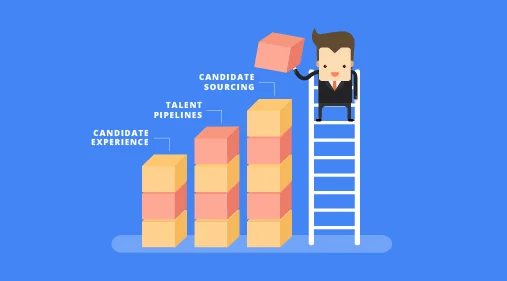Hello!
 How can employers find a way to balance streamlining the hiring process with capturing significant assessments of candidates without losing them?
How can employers find a way to balance streamlining the hiring process with capturing significant assessments of candidates without losing them?
It is gone a time when job seekers could simply send their CVs to many companies and receive a call for an interview.
Candidates must now go through an almost endless number of hiring rounds, while simultaneously overcoming new recruitment technology solutions. This is especially true in the tech, finance, and energy industries.
Candidates are now working through various obstacles, including navigating through an array of applications, tests, and using all technology from TikTok resumes to video recordings.
The additional steps involved in the hiring process can make it frustrating, complicated, frustrating, and even demoralizing. There is a common myth that a longer recruitment process will result in fewer qualified candidates for vacant roles.
 Most applicants are just trying to find a job by persevering with this number of interviews. They might not have the right qualifications or other opportunities to succeed in this role.
Most applicants are just trying to find a job by persevering with this number of interviews. They might not have the right qualifications or other opportunities to succeed in this role.
Bad interview experiences can lead to talent leaving and a negative reputation for a company through word-of-mouth.
How can employers find a way to balance streamlining the hiring process with capturing detailed assessments of candidates without losing them?
Despite all the advancements in modern-day recruiting techniques, current processes still face many challenges.
Talent shortage
 The global demand is high for tech talent in technology and digital industries, and other areas. The market demands are not being met at the moment, so the power is no longer held by HR professionals, but rather the tech-trained candidates.
The global demand is high for tech talent in technology and digital industries, and other areas. The market demands are not being met at the moment, so the power is no longer held by HR professionals, but rather the tech-trained candidates.
Recruiters find themselves in a competitive environment. They have to reach out to qualified candidates on job boards and other platforms. Companies must also increase their benefits and salary offers to attract the best talent.
Human touch and technology
Another problem is to determine when and how to use recruitment technology. When the HR professional should take over processing the applications. It is important to remember that the candidate’s experience in hiring is critical. The company’s culture will be reflected in its journey through each stage.
Trends to Watch
 Certain job interview methods are not suitable for certain industries. A recruiter might look for a programmer, but not an event coordinator.
Certain job interview methods are not suitable for certain industries. A recruiter might look for a programmer, but not an event coordinator.
The technology faces the same challenge. The tools that you use in one industry might not work for candidates in other niches.
Human resources professionals must be able to deal with both outdated and new interview techniques. There are too many rounds of hiring.
The fear of missing out can also lead to new, sometimes inappropriate recruitment methods.
Desperation
Companies face unexpected challenges in terms of quality and quantity due to a lack of available employment opportunities and talent shortages. The destruction of jobs caused by the COVID-19 pandemic has created gaps and many people are looking for work.
 Recruitment is costly and hiring managers must ensure that they do it correctly to avoid future problems. The company may have to re-hire a candidate if the new hire is not suitable for the job. This will add additional costs.
Recruitment is costly and hiring managers must ensure that they do it correctly to avoid future problems. The company may have to re-hire a candidate if the new hire is not suitable for the job. This will add additional costs.
How to choose the best interview strategy
Employers can use technology to identify the right candidate for vacant positions. Talent acquisition and HR professionals are experts in determining the best hiring models and technologies for each role.
The next step is to create a plan for interview strategy. This involves understanding your needs first and then adopting an agile recruiting process.
These are the three areas you should be focusing on:
Sourcing candidates
 There is no single approach to recruiting. Different generations and age groups use different job applications and HR professionals might use different hiring models. However, it is important to determine if a candidate meets the criteria for hiring before proceeding to the interview stage.
There is no single approach to recruiting. Different generations and age groups use different job applications and HR professionals might use different hiring models. However, it is important to determine if a candidate meets the criteria for hiring before proceeding to the interview stage.
Technology makes it possible to filter out the best candidates without having to go through thousands or hundreds of resumes. A brand can become overwhelmed by too many applications. Failure to respond effectively to them can cause irreparable damage.
Good recruitment strategies include exploring multiple channels to find more qualified interviewees for a specific role.
One industry
 It can be detrimental to the hiring process to copy trends that are not appropriate for a particular industry. Video resumes and other new methods of hiring are not appropriate for every industry. These measures may work well in more social roles, but not in a client-facing role.
It can be detrimental to the hiring process to copy trends that are not appropriate for a particular industry. Video resumes and other new methods of hiring are not appropriate for every industry. These measures may work well in more social roles, but not in a client-facing role.
While tests can be useful in some industries to determine a candidate’s suitability, they can also prove time-consuming and unhelpful in others.
In the digital age, versatility is crucial. It is important to be able to adapt to different application and interview processes depending on what sector you are in. This can help you find the right person.
Limiting Interview Rounds
 Companies should be aware that there is a talent shortage and not waste their time recruiting. The nature of the job and the company’s level will determine the number of interviews required. The hiring process is faster if the candidate can accept other offers.
Companies should be aware that there is a talent shortage and not waste their time recruiting. The nature of the job and the company’s level will determine the number of interviews required. The hiring process is faster if the candidate can accept other offers.
To ensure that candidates understand the process, and the timelines, guide them through it. For minor roles, limit the number of interviews to three rounds and for senior positions, four. Excessive rounds can only harm your company’s image in the eyes and minds of potential candidates.
Use a talent platform to recruit
Grit’s talent-first approach to hiring is revolutionary in terms of recruitment technology. Potential employers instead of candidates applying for companies, contact them directly through the website and highlight job opportunities that may interest them.
It allows you to filter talent by location, skills, salary, and HR professionals can help you target future employees and shortlist them for contact.
The platform also reduces the time it takes to shortlist candidates to 24-48 hours, and the hiring times go down from a maximum of 12 weeks to three weeks. The website allows candidates to register in just minutes. The profile remains anonymous until the potential employer requests the details.
 This search method is different than traditional job hunting and recruitment methods. This search method saves time, money, and resources by streamlining the process and eliminating unnecessary recruitment headaches.
This search method is different than traditional job hunting and recruitment methods. This search method saves time, money, and resources by streamlining the process and eliminating unnecessary recruitment headaches.
As technology advances such as AI and machine learning innovations and better hiring strategies become available, talent recruitment will continue to evolve. The initial steps to streamlining the process include robot interviews and the submission of video resumes. Human stages will follow.
Many recruits and HR professionals will adapt easily, while others may have difficulty adapting to new realities.
As the market changes, recruiters need to review their business processes. Although no hiring process is perfect, it’s possible to find one that is suitable for the position candidates are applying for as well as the job level within the company.
 It is important to reduce the time taken for interview stages in order not to frustrate applicants. Candidates who feel that the interview process is too long might abandon the job, believing that the recruiter has undervalued the effort and time they put into applying for the position.
It is important to reduce the time taken for interview stages in order not to frustrate applicants. Candidates who feel that the interview process is too long might abandon the job, believing that the recruiter has undervalued the effort and time they put into applying for the position.
This can reflect badly on an organization as it may lead to long, tedious procedures that are part of their work culture.
It is incorrect to believe that a one-to-three-month hiring process is the best way to secure the perfect employee.
A company may find a great candidate this way. However, those with more options and who are desperate will likely stay longer than others. It results in a long, tedious and frustrating interview process.
Also read:
- Is Amazon Bank the Future of Banking sector?
- What Are The Best Zoom Alternatives?
- Quasacoins (QUA) airdroped on 08/19/2021
Thank you!
Join us on social networks!
See you!






